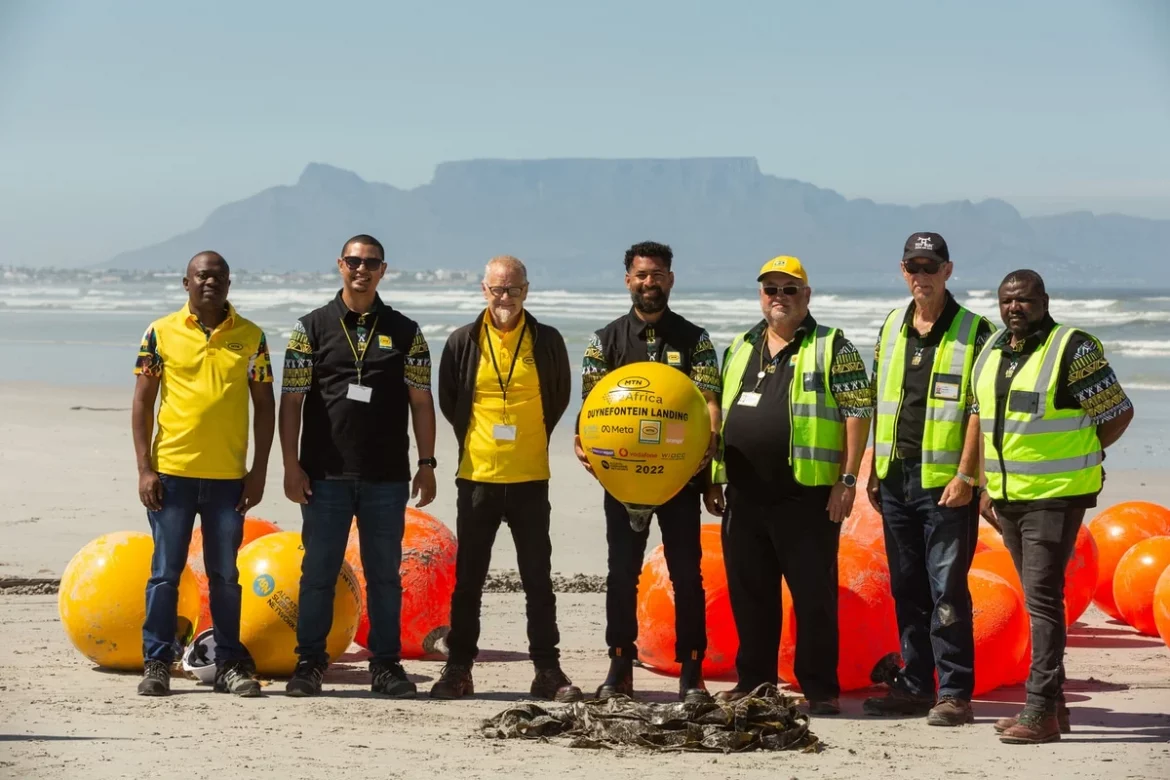The world’s longest undersea cable, 2Africa, has made landfall at Yzerfontein and is linked to its cable landing station at Duynefontein near Cape Town.
MTN GlobalConnect officially announced the landing on Tuesday. It brought the cable to shore last week.
2Africa is owned by a consortium of companies, including MTN GlobalConnect. The other members are China Mobile International, Meta Platforms (formerly Facebook), Orange, Center3 (formerly STC), Telecom Egypt, Vodafone, and WIOCC.
When completed, the cable will stretch 45,000km. It circumnavigates the African continent, connecting it to Europe and Asia.
In addition to being the world’s longest cable, 2Africa will also have the highest design capacity of subsea cables currently serving the continent at 180Tbps. It will be 36Tbps faster than Google’s massive Equiano cable, which itself was over seven times larger than other cables connecting South Africa to Europe and Asia.
When the 2Africa Consortium first announced the cable in 2020, it said the total length would be 37,000km with 21 landing stations in 16 countries in Africa.
In September 2021, the consortium announced the 2Africa PEARLS branch extending to the Arabian Gulf, India, and Pakistan — bringing the length of the system to over 45,000km.
With the extensions, the cable will now serve 33 markets and have at least 47 landing stations. Of these, MTN GlobalConnect will be handling six carrier landing stations — two in South Africa and one each in Ghana, Nigeria, Côte d’Ivoire, and Sudan.
Given the glut of subsea cable capacity now landing in South Africa, MyBroadband asked MTN GlobalConnect Chief Fiberco Officer Mohammed Aliyu whether all the additional capacity is needed.
“2Africa is the first cable going around Africa. You’ve got cables on the East and West [coasts], but this is the first time you’ve got a cable that is designed to serve the whole of Africa,” Aliyu said.
“This will be able to support Africa and connect it to Asia — India, Pakistan — as well as connect it to Europe and the rest of the world.”
Aliyu believes this is the most important thing about the 2Africa cable. “Data growth in Africa has been exploding, even before the pandemic. That’s why you’re seeing all the hyperscalers coming in,” he said.
“[Building 2Africa] is not about bringing in excess capacity. It’s much needed. It’s not ‘too much for Africa’, if I can put it that way.”
Alcatel Submarine Networks was appointed to build 2Africa and its extensions using a new technology called Spatial Division Multiplexing (SDM).
One benefit of SDM is that it allows 2Africa to support up to 16 fibre pairs, whereas older technologies used in existing African cables supported a maximum of eight. “SDM is a more cost-efficient technology,” Aliyu said.
“With SDM we can also offer both a fibre pair that’s spectrum sharing or full independent fibre with reasonable capacity, compared to what traditional pipes would usually have.”
In addition to greater cost-efficiency and higher capacity, Aliyu said 2Africa’s design also lets it lie 50% deeper than other cables, making it more resilient. Asked how many wavelengths per fibre, and how much capacity per wavelength will be available, MTN GlobalConnect said it could not comment at this stage as it is still busy with its configuration.
MTN GlobalConnect CEO Frédéric Schepens said they expect to light several terabits per second of capacity within the first year of operation. “I can’t give you an exact number at the moment,” Schepens said. “It depends on the customer demand. What I can tell you is we presold quite a lot of capacity already.”
Regarding the scale of their investment, Schepens said that MTN GlobalConnect is investing $500 million (R8.8 billion) over the next three years, starting in 2022, as part of its Ambition 2025 project. “Our investment is one of the largest contributions in developing digital infrastructure on the continent,” stated Schepens.
“Our accelerated investments in digital infrastructure in Africa will be critical for the growth of African economies and the livelihoods of the people in the years to come.”
SOURCE: My broadband

